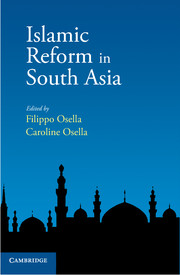Book contents
- Frontmatter
- Contents
- List of Contributors
- Introduction
- Part I Reformist Journeys
- Part II Debating Reform
- Part III Everyday Politics of Reform
- 11 Reading the Qur'an in Bangladesh: The Politics of ‘Belief’ Among Islamist Women
- 12 Cracks in the ‘Mightiest Fortress’: Jamaat-e-Islami's Changing Discourse on Women
- 13 Islamic Feminism in India: Indian Muslim Women Activists and the Reform of Muslim Personal Law
- 14 Disputing Contraception: Muslim Reform, Secular Change and Fertility
- Part IV Reform, State and Market
- Index
13 - Islamic Feminism in India: Indian Muslim Women Activists and the Reform of Muslim Personal Law
from Part III - Everyday Politics of Reform
Published online by Cambridge University Press: 05 January 2014
- Frontmatter
- Contents
- List of Contributors
- Introduction
- Part I Reformist Journeys
- Part II Debating Reform
- Part III Everyday Politics of Reform
- 11 Reading the Qur'an in Bangladesh: The Politics of ‘Belief’ Among Islamist Women
- 12 Cracks in the ‘Mightiest Fortress’: Jamaat-e-Islami's Changing Discourse on Women
- 13 Islamic Feminism in India: Indian Muslim Women Activists and the Reform of Muslim Personal Law
- 14 Disputing Contraception: Muslim Reform, Secular Change and Fertility
- Part IV Reform, State and Market
- Index
Summary
Introduction
In recent years, growing numbers of Muslim women in India have been publicly calling for reform of Muslim Personal Law (MPL), justifying their demands for gender equity with religious arguments, referring to the authority of the Qur'an rather than to the Indian Constitution or to the universalistic principles of human rights that have long guided Indian secular feminists in their campaigns for a gender-neutral uniform civil code (UCC) of personal law. These women are part of a trend observable all over the Muslim world, in which ‘a new breed of Muslim women scholaractivists’ (Sikand 2005a) is seriously and critically studying the foundational texts of their religion. They are
challeng[ing] conventional histories and canonical texts … pointing to the openness of the Qur'an and Sunna to ijtihad… looking at the context in which the Qur'an was revealed… [and] applying this understanding to the present so as to question the ways in which Islamic knowledge has been produced. (Cooke 2001: 62)
Scholars of the Middle East began to use the term ‘Islamic feminism’ in the 1990s for movements then gaining prominence in Egypt, Iran and elsewhere, in which women were attempting, ‘through a rereading of the Qur'an and early Islamic history’ to ‘reclaim their religion… [and] undermine both Islamist patriarchal distortions and Western stereotypes of Islam as backward and terroristic’ (Moghadam 2004: 53).
- Type
- Chapter
- Information
- Islamic Reform in South Asia , pp. 346 - 382Publisher: Cambridge University PressPrint publication year: 2013
- 7
- Cited by



